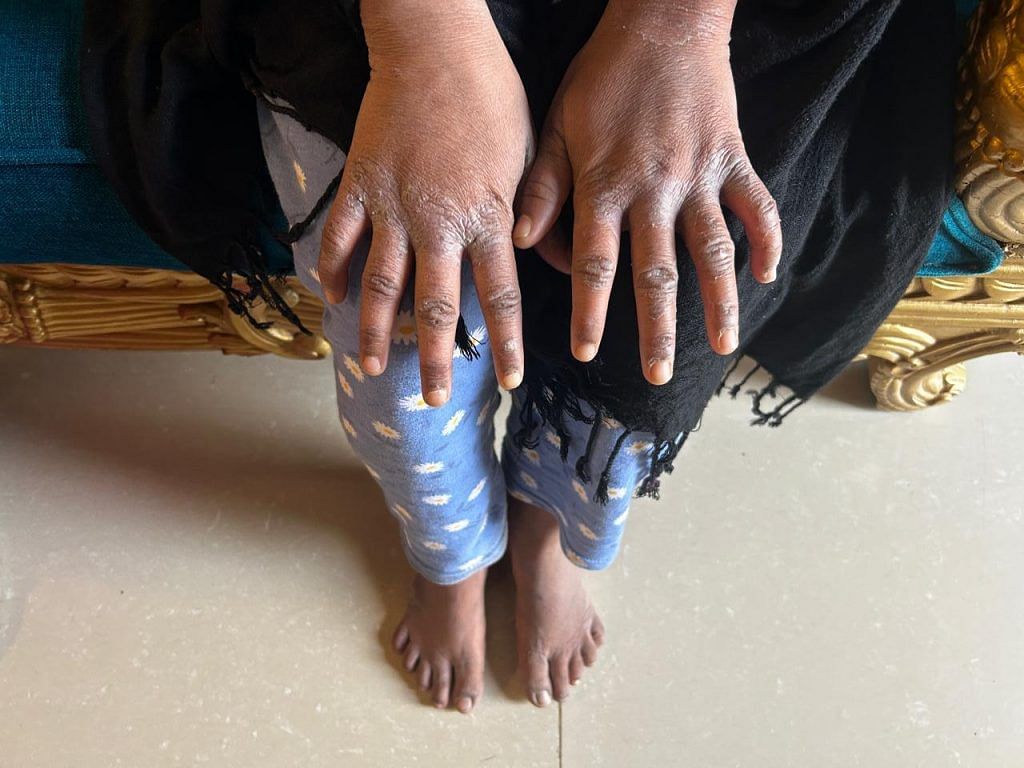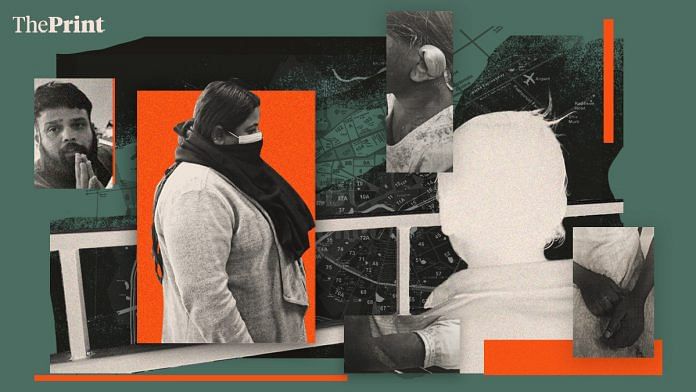Gurugram/New Delhi: Advocate Vandana Oberoi’s heart pounded as she frantically searched the crowded Gurugram district court complex for her client, a teenage girl from Jharkhand. The girl had accused her employers of mercilessly beating and sexually harassing her, but now she seemed to have vanished. Oberoi’s calls went unanswered, and she worried the court might issue a warrant against her client. Then, suddenly, another advocate drew Oberoi’s attention to the witness box—there stood the teenager, recording her statement. Oberoi immediately realised that her client had turned “hostile”.
Last February, the teenager from Jharkhand’s Simdega district had been rescued by the police from her abusive employers who allegedly punched her, deprived her of sleep, and made her scavenge for food from the dustbin. For almost three months, the girl stuck to her truth—to the police, Child Welfare Committee, and magistrate. But the victim withdrew her statement in court.
Oberoi wasn’t surprised; she said she was almost expecting it.
This case of abuse had captured national headlines and put the spotlight on the pervasive issue of trafficking and abuse of minor girls working in households across India. It also highlighted the difficulty faced by the police and lawyers in delivering justice to countless migrant rural domestic workers who come to big shiny cities. Most cases fizzle out after the initial urban middle-class and social media outrage. Meanwhile, regulating this sector with exemplary punishment becomes challenging.
Not only is there a problem of gross underreporting, but even when these incidents are covered, the victims rarely see justice. The outrage is limited to that one case of abuse, and then people retreat to their homes maintained by the domestic workers from Bihar, Jharkhand, and other parts of India. Intimidation, poverty, apathy, and a slow and stuttering justice system all have a part to play in this.
We feel frustrated, defeated. Most cases go nowhere and we end up in the same loop
-Nishi Kant, executive director of NGO Shakti Vahini
Minor children from states like Jharkhand, Bihar, and West Bengal are lured to cities like Delhi and Mumbai with promises of a better life as domestic workers. The children are often trafficked by their acquaintances or family members and then find themselves in vulnerable situations stripped of communication from the outside world and often physically abused.
“When such stories are reported, a Peepli Live happens. The media descends on the minor’s house, asking for intricate details about their lives. Fiery tweets are written. Polished opinion pieces are written by Delhi’s rich who shed crocodile tears over the plight of the poor. And once that media glare is gone, powerful employers reach compromises with minor victims who are always bullied, and the cycle continues,” said Nishi Kant, executive director of Shakti Vahini, a Delhi based NGO that rescues and rehabilitates victims of child trafficking.
“People won’t be let off the hook so easily if the children belonged to a different class. Our fight is between the rich and the poor.”
In many cases, children from villages are lured to cities with dreams of a better life and a chance to fulfill aspirations drawn from Instagram reels. More often than not, their families are complicit in their trafficking
Also Read: Jharkhand girls leave home for English, movies, city life. Then they face India’s urban rich
Simdega to Gurugram
When news of the Simdega teenager’s ordeal broke, it quickly caught the attention of Jharkhand’s former Chief Minister, Hemant Soren. Everyone from the Jharkhand police to the district collector responded with alacrity to his tweet demanding strict action.
The girl was rescued on 7 February 2023 from the house of Kamaljeet Kaur and Manish Khattar in Gurugram Sector 10, where she had been working for five months. New Colony police station in Gurugram took cognisance of the matter after the story of the girl was posted to X (then Twitter) by someone who claimed she had been tipped off by a concerned neighbour.
Kamaljeet & Manish broke 3 WIPERS & many STICKS in last 4 months in beating this child. They kept a watch from office via CCTV & if she ate anything, she was beaten. Kamaljeet broke child's teeth hitting her with kadchi
Belts, fork, Kadchi, chimta, belan, Tawa – THEY USED ALL pic.twitter.com/G4aYzYWxmq
— Deepika Narayan Bhardwaj (@DeepikaBhardwaj) February 10, 2023
The teenager had alleged that she was burnt with hot tongs, and was sexually abused. “My employers have behaved inhumanely with me. Kamaljeet Kaur heated iron tongs and applied them to my private parts. Manish Khattar used to undress me and hurt me on my private parts. I was made to work all day, and was given only a bit of rice to eat,” the police complaint reads.
Kaur and Khattar have been booked under provisions of the Protection of Children from Sexual Offences Act 2012 (POCSO), the Juvenile Justice Act 2015, the SC/ST Act, and several sections of the Indian Penal Code, including 323 (voluntarily causing hurt), 342 (wrongful imprisonment), 324 (causing hurt with dangerous weapon), 370 (trafficking) and 506 (criminal intimidation). A few days before their arrest, they were let go from their jobs. They have not secured bail yet.
But the case proved to be problematic from the get go, beginning with the girl’s age. In the FIR she’s listed as 17, but a hospital discharge slip says she’s 15, and while recording her statement in front of the magistrate, she said she was 14. “I initially lied about my age because I was told to do so at home, so I could secure employment as a domestic worker,” she told the Child Welfare Committee last year.
NGOs sprang into action and started building a case for the girl, also ensuring that she and her family were compensated by the state. The girl was brought back to Jharkhand where she is currently studying in class 6 at a Kasturba Gandhi school.
The girl says she is now happy, and enjoying school and hostel life. Jharkhand rehabilitates many minor girls at its Kasturba schools, and teachers working with district Child Welfare Committees, are equipped to meet the needs of the children.

“I’ve never experienced this life before,” she told ThePrint. It’s another matter that she had gone missing from her village for three years, but nobody had followed up with the authorities. Her brother in Jharkhand feigned ignorance about the case—which fell apart on the day of her first hearing in court.
“I can’t be travelling back and forth to Gurugram from here. So, I didn’t tell the court what I told everyone else,” she said over the phone. She then later alleged the court didn’t ask her any questions. “I was only asked my name, where I am from, and how old I am. If they had asked me about the abuse, I’d have told them.” She didn’t deny or contradict her previous statements.
Oberoi, who no longer represents the teenager, counters these claims. The advocate and her team are currently working to overturn the Rs 1.2 lakh compensation provided to the victim and her family. “Now that she’s withdrawing her statements in the court, the compensation given to her and her family should also be taken back,” Oberoi said.
However, all the girl’s statements to the CWC, magistrate, and police cite instances of abuse.
“According to the minor’s statement, the accused have abused her mentally and physically. They used casteist slurs against her. She was made to work without clothing. She was beaten with hot tongs. And she used to be punched in her private parts. She was pulled from her breasts via the male accused… She was a bonded labour,” the Child Welfare Committee Gurugram recorded on 16 February 2023.
When we were sitting at the police station, the officers there ordered my father to get them all tea. He went out, bought tea, and served it to all the officers. He then returned to his place on the floor, alongside me
-Bihar minor, rescued from a Gurugram home in December 2023
In her statement before a magistrate, recorded on 17 February, the teenager gave further details of the abuse that was allegedly meted out to her, which included sleep deprivation, sexual and physical abuse as well as starvation. She told the magistrate that she had come to Delhi along with her maternal uncle and several others and started working in a factory, but because of her age the company soon informed her she couldn’t work with them. It was then that she was hired by Kamaljeet Kaur and Manish Khattar.
She was admitted to Civil Hospital Gurugram on 7 February and was discharged eight days later. On her discharge slip, the doctors noted multiple cuts, superficial burns, and swelling on her ears, feet, and hands.
Despite this body of evidence, Oberoi questioned whether the court will consider it in light of the girl’s retracted. “It is difficult for the court to rely on other evidence when the main complainant turned hostile,” she said.
ThePrint contacted Shyambir Singh, advocate of the accused couple, Manish Khattar and Kamaljeet Kaur, but he refused to comment. “I cannot respond at this juncture of the case. You also have no right to question me on anything,” he said over the phone.
What has changed is the increasing public support for the rights of domestic workers. Middle class conscience is more easily stirred today than a few decades ago.
Creaking state machinery, low convictions
When it comes to securing convictions in child trafficking cases, the odds are stacked against the victims. The cycle persists due to poor families’ desperation to send their daughters to big cities, the failure of the police to crack down on ‘placement’ agencies hiring these girls, and the long grind of court cases.
“We feel frustrated, defeated. Most cases go nowhere and we end up in the same loop,” said Shakti Vahini’s Nishi Kant.
ThePrint had earlier reported that there’s virtually no action taken against the many trafficking rings functioning as ‘placement agencies’ in Jharkhand and Delhi. In the past, the most powerful trafficker to be nabbed was Panna Lal Mahto, who has been accused of running trafficking rings between Delhi and Jharkhand.
In many cases, children from villages are lured to cities with dreams of a better life and a chance to fulfill aspirations drawn from Instagram reels. More often than not, their families are complicit in their trafficking, raising an alarm only when payments don’t come through, or they fail to establish contact with their wards after a long gap. The minors, in many instances, are also escaping the violence they experience in their own homes.

Data from the 2022 report of the National Crime Records Bureau (NCRB) paints a bleak picture of justice delayed and denied. While 424 child trafficking cases were reported from India that year,, investigations in 435 additional cases remain ongoing.
The pendency rate of such cases in courts stands at 93 per cent, which means that most cases were still pending at the end of the year. Moreover, there are nearly thrice as many acquittals as there are convictions, indicating that the state is failing to build convincing cases against the accused. Only 23 cases tried under IPC Section 370 led to convictions, while 71 ended in acquittals.
“The victims in cases of Section 370 are extremely vulnerable, and conviction rate is abysmal,” Kant said. “The justice system is failing these children.”
Also Read: Smack & ‘solution’ are consuming Delhi’s homeless kids. For them it’s a refuge
An endless cycle?
The case of the teenager from Simdega shook the collective conscience of many, but it didn’t lead to sensitisation of the population at large. A few months after her case, another girl from Bihar endured horrific abuse at the hands of her employers in Gurugram. They allegedly even set their dog loose to attack the girl.
The 17-year-old girl was rescued by her parents, and other concerned citizens of Gurugram after enduring nightmarish conditions at the house for three months.
“She [the employer] told me she would murder my family if I tried to contact them. She would drag me by my hair and pluck them out from my head,” the girl told ThePrint. “I wasn’t given enough food to eat. Her sons would record me without clothes.” The minor also alleged that her employer poured acid on her hands.
“If a strong precedent was set and action taken in the case of the Jharkhand minor, then a similar incident wouldn’t have been repeated in Gurugram in such a short span of time. These cases aren’t new, but metro cities are only now waking up to them,” Kant said.

What has changed is the increasing public support for the rights of domestic workers. Middle class conscience is more easily stirred today than a few decades ago.
However, victims still face an apathetic system during investigation, especially in cases where sustained media attention is lacking. In the case of the girl from Simdega, the state machinery acted rapidly, an FIR was filed promptly, and the CWC came in contact with the girl quickly. Teams were dispatched from Simdega at the behest of then CM Soren and the girl was enrolled in a school. But this is not necessarily the norm.
Cases without the “high-profile” tag tend to be treated more casually, leaving little recourse for vulnerable and poor families who don’t have the means to fight for justice in court.
The family of the minor who was rescued in December 2023 said she received no state compensation. And they claim they don’t even have access to her discharge slip from the hospital.
“When we were sitting at the police station, the officers there ordered my father to get them all tea. He went out, bought tea, and served it to all the officers. He then returned to his place on the floor, alongside me,” the minor alleged.

The Gurugram Domestic Workers Association wants the state to ban 24×7 employment of women or children for household work. After the December case, Gurugram deputy commissioner Nishant Yadav declared that the district was creating a charter of rights for domestic workers, which would be implemented within two weeks. That was in December, but it is yet to be rolled out.
Yadav and his office are deliberating on parameters such as working hours, minimum wage, and the number of meals employers must provide to domestic staff. Also under consideration are medical camps for domestic workers and record-keeping by Resident Welfare Associations (RWAs). DC Yadav told ThePrint that the charter will be implemented “in 10 more days”.
However, Kant of Shakti Vahini remains sceptical about such interventions.
“We’re just mopping the floor with such knee-jerk statements and proposals of policy making. State labour departments should be coming up with policies, not DCs,” Kant said.
As Gurugram deliberates on its charter, the teenager rescued in December continues to look for homes in posh societies to help her parents financially. Attending school is not part of her future.



